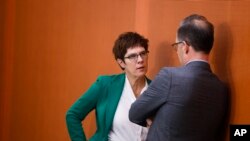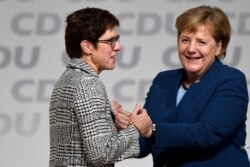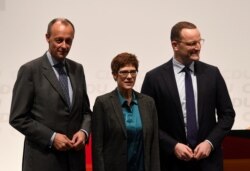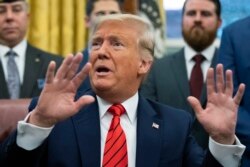The surprise decision by Angela Merkel’s heir apparent to quit as leader of Germany’s largest party has thrown the country’s politics into disarray — and reignited a potentially divisive contest to succeed the German chancellor, who plans to retire next year, say analysts.
Annegret Kramp-Karrenbauer, who became leader of the Christian Democrats (CDU) a year ago, announced she was stepping down Monday. Her decision came amid mounting criticism of her handling of a squabble over CDU lawmakers collaborating in the eastern state of Thuringia with members of the far-right Alternative for Germany party (AfD) following an inconclusive state election.
“I’ve been thinking about this decision for some time now,” Kramp-Karrenbauer said at a news conference in Berlin. Her short tenure as party leader had been accompanied by a series of gaffes and toxic divisions over the party’s future direction, all of which sapped her authority. She plans to remain as Germany’s defense minister, but says she will not seek the CDU nomination to be the party’s chancellor-candidate at the next general election, due in the autumn of 2021.
The departure of her handpicked successor from the party leadership has upended Merkel’s retirement plans and triggered speculation that it might set the circumstances for an early snap election in the spring of 2021. Merkel had carefully installed Kramp-Karrenbauer as CDU leader to effect an orderly transition, say analysts. Her departure now raises the question of who will succeed Merkel and how the different wings of the CDU can be reconciled.
The party has been riven over whether to continue with Merkel’s centrist strategy or return to its more traditional Conservative roots.
Analysts say the frontrunners are Friedrich Merz, a fiscal conservative and Merkel critic, Jens Spahn, Germany’s current health minister, and Armin Laschet, the state premier of North Rhine-Westphalia. All of them lost out to Kramp-Karrenbauer in a 2018 leadership race thanks to Merkel’s endorsement of the woman she hoped would succeed her as the country’s Chancellor.
Merz wants to tug the CDU in a more right-wing direction. His two rivals are close to Merkel and favor centrism. They believe the CDU should ready itself for a possible coalition partnership with Germany’s rising Greens after a 2021 general election.
Emily Mansfield of the Economist Intelligence Unit, says all the contenders to succeed Merkel face the challenge of healing the splits between state-level and federal-level CDU politicians and the problem of “how to balance tough competition from the AfD with the fact that the CDU’s next coalition partner is most likely to be the Greens.”
Merkel’s succession crisis comes at a difficult time for Germany. Recession fears are growing. German industrial production has fallen in five of the last seven months. Provisional projections have the country’s economy growing just 0.4 percent this year and 0.9 percent in 2021, but economists warn Germany could easily slide into negative growth territory.
“I am pessimistic about the German outlook because Germany could experience something like the perfect storm,” Marcel Fratzscher, President of the German Institute for Economic Research, told CNBC. Among the risks he highlights are a global trade slowdown, the impact of coronavirus, geopolitical strains, especially between Europe and the U.S., and potential economic disruption from Brexit.“
The CDU will again be preoccupied with the leadership discussion and a more strategic discussion on how to deal with the AfD,” worries Carsten Brzeski, chief economist for ING, the Dutch multinational bank.
In a note to investors, Brzeski says “the orderly transition of German politics into the post-Merkel era seems to be failing. The country will continue to face a more fragmented political landscape, with parties having to rethink past red lines and potential coalition partners.”
He says the timing is unfortunate for Europe as a whole. “For the eurozone, expect even more inward-looking German politics than before and, hence, less progress on any more Eurozone integration.” Central bankers and EU policymakers have been urging the German government to be less fiscally conservative and to boost government spending, believing that will help boost growth across the flagging eurozone.
Other European analysts say Berlin’s preoccupation with domestic politics will ill-serve it to prepare for a coming trade battle with Washington. On Monday, U.S. President Donald Trump said he is setting his sights on rebalancing the more than $1 trillion U.S. trade relationship with the EU, raising the prospect of a transatlantic trade war.
He told U.S. governors: “Europe has been treating us very badly. Over the last 10, 12 years, there’s been a tremendous deficit with Europe. They have barriers that are incredible ... So we’re going to be starting that. They know that.” European officials say they will retaliate, if President Trump makes good on a threat to impose tariffs on European-manufactured cars and other products. Washington and the Europeans are in conflict over airline subsidies, agricultural trade barriers and EU plans to start taxing U.S. digital companies.








